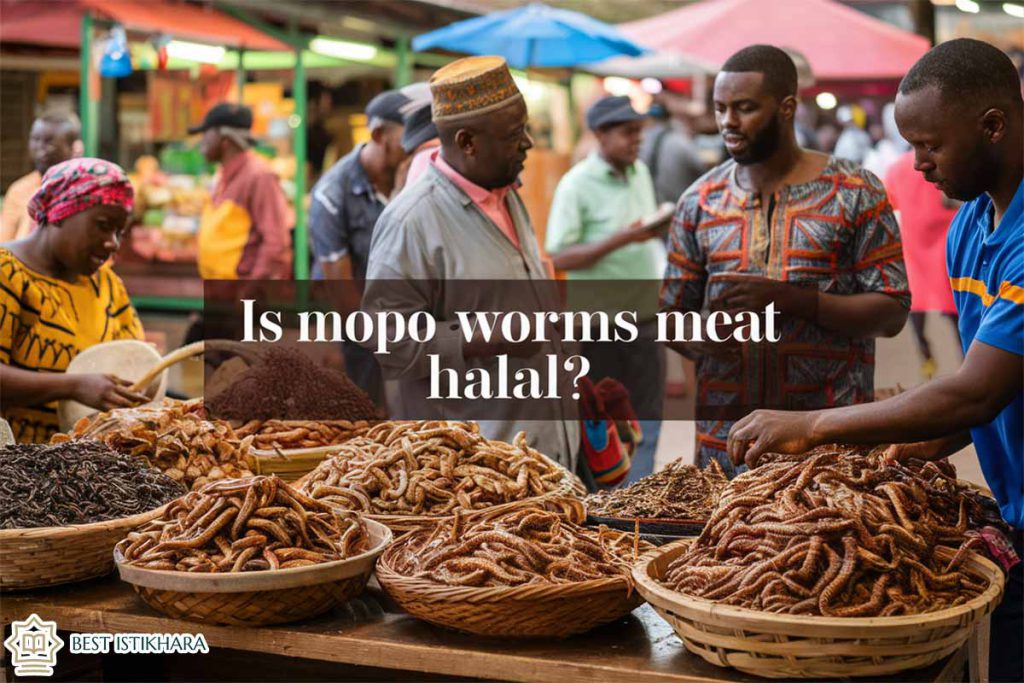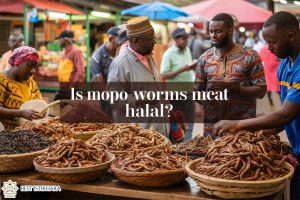Is Mopo Worms Meat Halal?

Mopane worms, known scientifically as Gonimbrasia belina, are the larval stage of the Emperor moth and are a staple food source in many parts of Southern Africa, including Zimbabwe, Botswana, and Namibia. These caterpillars are found on Mopane trees, from which they derive their name. Mopane worms are harvested predominantly during the rainy season when they are most abundant. The collection process is often a community activity involving both adults and children. Once harvested, the worms are typically cleaned, boiled, and sun-dried or smoked to preserve them. They are consumed in various ways: dried as a crunchy snack, rehydrated and cooked in stews, or canned in sauces. Rich in protein, vitamins, and minerals, Mopane worms are a vital nutritional resource and an essential economic commodity in rural areas. Their role in the diet and economy underscores their significance beyond just being an insect, making them a crucial element of Southern African culture and sustenance. Click to get more information about halal vs haram topics discussed in today’s world.
Are Mopane Worms Halal? Islamic Dietary Laws Explained
Determining whether Mopane worms are halal involves examining Islamic dietary laws derived from the Quran, Hadith, and scholarly interpretations. The primary sources for halal dietary laws, such as Surah Al-An’am 6:145 and Surah Al-A’raaf 7:157, generally prohibit consuming impure or harmful substances. Insects, in general, are a contentious issue. Some Islamic scholars, particularly from the Hanafi school of thought, classify most insects as haram (forbidden) due to their classification as “impure” or “filthy.” However, the Maliki and Shafi’i schools of thought have more permissive views, allowing the consumption of specific insects not deemed harmful.
Mopane worms, specifically, are a grey area. They are not explicitly mentioned in the Quran or Hadith, leading to different interpretations. The worms are widely consumed in Southern Africa, including by some Muslim communities. Many local scholars may permit them based on necessity and nutritional value, emphasizing that they must be adequately cleaned and cooked. The permissibility can also depend on the preparation method, ensuring the worms are free from impurities and toxins before consumption.
Differing Opinions Among Islamic Scholars
Islamic scholars have diverse opinions on the permissibility of eating Mopane worms, mainly due to differing interpretations of religious texts and cultural contexts. The Hanafi school of thought typically classifies most insects as haram, viewing them as impure and unfit for consumption. This perspective is rooted in the interpretation of Quranic verses and Hadith that emphasize avoiding unclean and harmful substances.
Conversely, scholars from the Maliki and Shafi’i schools have more lenient views. They permit the consumption of certain insects, provided they are not harmful and are prepared in a way that removes impurities. This leniency extends to Mopane worms, especially in regions where they are a significant nutritional source. These scholars argue that necessity and nutritional benefits can justify their consumption.
Additionally, some contemporary scholars consider the local dietary customs and the nutritional value of Mopane worms. They may permit them based on the urf (custom) principle and the need for affordable, nutritious food in many African communities. Thus, the permissibility of Mopane worms can vary, reflecting a spectrum of scholarly interpretations within the Islamic tradition.
Conclusion
The halal status of Mopane worms remains a nuanced topic within Islamic dietary laws. While the Hanafi school typically views most insects as impure and thus haram, the Maliki and Shafi’i schools offer more permissive interpretations, especially when considering the nutritional benefits and cultural significance of Mopane worms. These divergent views highlight the flexibility and contextual considerations within Islamic jurisprudence. As a significant source of protein and an economic staple in Southern Africa, the consumption of Mopane worms is often supported by local scholars who emphasize necessity and nutritional value. Ultimately, individual religious beliefs and scholarly consultation should guide the decision to consume Mopane worms.






